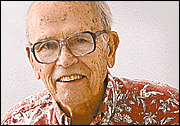


Hawaii’s World
Improving the law
First | Second of four articles
on living willsEARLY in the 1990s, thousands of volunteer hours went into lobbying for Hawaii's first living-will laws. They permit people to direct their final care including the option of removal from artificial life support.
Those pioneer successes are vastly broadened by a 1999 state legislative decision to make Hawaii the sixth state to adopt a National Uniform Health Care Decisions Act. Backers are jubilant. They thought it might take several years to lobby the bill through the Legislature.
Governor Cayetano is expected to sign and perhaps execute his own advance directive on the spot. Unlike the old law, no notarization will be required if two persons attest that they witnessed the patient's signature.
"Advance directive" is the term now preferred to "living will," which some people mistook for a distribution of assets. Existing living wills remain valid, however.
The Legislature made some changes in the model law before enacting it, primarily to further minimize concern about terminating the lives of people who wouldn't want it. No problem, says the American Bar Association's national watchdog.
The uniform act covers patients who are incompetent to speak. There is a process to name a family member or friend to make decisions that they would want or -- if their wishes aren't known -- to act in their best interest. This could include withdrawal of life support.
For the very few who will have neither family nor friend to speak for them, the law has a strong protection against any "slippery slope" termination of lives.
Such a surrogate can choose to withdraw life support only if two doctors find "the patient is highly unlikely to have any neurological response in the future." The Hawaii Right to life organization remains unsatisfied with the bill but the Hawaii Catholic Conference strongly supports it. Catholic concern focuses on allowing the end of life to come naturally without euthanasia or suicide.
The model act can cover long-term degenerative diseases as well as terminal illness. It draws attention to the option of organ donation. It permits designation of a physician to oversee final care and/or grant power of attorney for health care to a designated agent.
A sample advance directive form is included in the act. It can be modified and expanded by the person making it.
Sources familiar with the issue unanimously urge that all adults -- even young people -- should discuss their final care wishes, including organ donation, with persons close to them.
AN advance directive should be put in an accessible place, such as in one's personal medical record. Copies should go to those concerned -- but not to a safe deposit box, where it won't be handy when needed.
A penalty clause in the model act makes care providers liable for not abiding by an advance directive or the surrogate's directions. In the past living wills have been widely ignored.
Legislative co-chairmen and women who signed the final conference committee report recommending House Bill 171 as amended were Sens. Suzanne Chun Oakland, Avery Chumbley and Matt Matsunaga and Reps. Alexander C. Santiago and Paul T. Oshiro. Fine work.
A.A. Smyser is the contributing editor
and former editor of the the Star-Bulletin
His column runs Tuesday and Thursday.